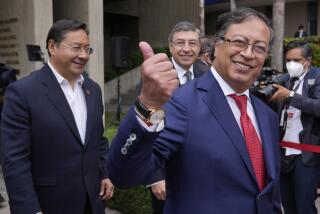Sandinistas Press Attacks on Cardinal, Truce Panels
- Share via
MANAGUA, Nicaragua — In a conflict with Nicaragua’s Roman Catholic cardinal, the Sandinista government has moved to paralyze two independent groups that monitor its adherence to peace accords with neighboring countries and U.S.-backed rebels.
One of the bodies, the National Reconciliation Commission, was set up to oversee Nicaraguan compliance with the five-nation Central American peace agreement of August, 1987. It has been inactive since last month because the government representative refuses to attend its meetings.
The Sandinistas acted this week against the other group, the Verification Commission that is supposed to be supervising the March 23 cease-fire accord in the war with the Contras. Officials blocked the import of 17 jeeps purchased by the commission for observers in the war zones, saying the commission must first sign an agreement that would limit its powers.
Harassment Reported
Meanwhile, the government has declined to cooperate with investigations by both bodies into alleged Sandinista violations during a two-month-old crackdown on political dissent. The Verification Commission said police have harassed several of its 124 truce observers.
These attempts to curb the monitoring groups have come to light since a coordinated attack by pro-government news media against Cardinal Miguel Obando y Bravo, who heads the reconciliation commission and is one of two leaders of the verification panel.
The actions were further evidence of the unraveling of both peace accords--a process that began in Nicaragua when talks on a final armistice collapsed June 9.
Sandinista and Contra negotiators agreed at the time to maintain their truce and recognize the Verification Commission. However, the Sandinista radio and newspapers ridiculed the arrival Tuesday of the commission’s Japanese-made jeeps, suggesting they were “luxury imports” for personal use by the cardinal and his staff. They said the jeeps were tainted by their purchase with funds from the U.S. Congress, which also supports the Contras.
Accused of Power Grab
Later, the government accused Obando of trying to take control of the Verification Commission from its other member, Joao Baena Soares of Brazil. Soares, president of the Organization of American States, is more willing to accept Sandinista restraints on the panel’s role, diplomats say, and has kept silent on the issue.
Reacting to the criticism, Obando told the opposition newspaper La Prensa that he will keep working “to imitate Christ . . . to break down the walls of hate so Nicaraguans can live in brotherhood.” But a church spokesman, Father Bismark Carballo, said the cardinal is ready to resign his peacemaking roles “if the government does not want him to continue.”
“The government is trying to discredit the cardinal and freeze the peace process,” said Erick Ramirez, an opposition leader. “Both commissions became too active, and this made the Sandinistas uncomfortable.”
Sandinista officials blame the Reagan Administration and the Contras for breaking off peace talks. They are frustrated that Obando, a popular figure in Nicaragua, refuses to voice that view. Instead, he insists that the government bears much of the blame.
‘Little Left to Verify’
“The peace accords are in doubt because the Contras have left them in doubt,” acting Foreign Minister Victor Hugo Tinoco told reporters. While denying any loss of confidence in Obando, he said, “Under the circumstances, there is very little left for him to verify.”
Tinoco said the Verification Commission has been asked to sign an agreement that would limit its role to monitoring truce violations. But the cardinal insists on monitoring all terms of the cease-fire agreement, which obliges the Sandinistas to guarantee “unrestricted press freedom.”
Even in policing the truce, the commission has been stymied by the government’s denial of safe-conduct passes to the war zones for some staff members, who are suspected of bias toward the Contras.
“What gives the government the right to say how the commission can operate and with what people?” Father Carballo asked.
Rebel leaders have repeatedly asked the commission since July to denounce Sandinista censorship and arrests of dissident leaders. In the latest case, El Nicaraguense, a radio news program run by the Chamber of Commerce, was ordered off the air Thursday for comparing President Daniel Ortega unfavorably to Gen. Augusto Pinochet, the Chilean strongman.
Authority Disputed
In each case, the Sandinistas have rejected the verification panel’s authority to act. They have referred such political disputes to the National Reconciliation Commission, made up of the cardinal, a Protestant minister, a government official and an opposition leader.
However, that body was effectively shut down after its opposition member, on a special mission to Miami last month, failed to win freedom for hundreds of Nicaraguans that the government says are captives in Contra camps in Honduras. Instead, he brought back a list of several thousand prisoners the rebels claim are held secretly in Sandinista jails.
Vice President Sergio Ramirez, the government member of the commission, has announced he will not attend its meetings until after the five Central American presidents review their regional peace accord at a summit set for mid-November.
That accord called for ending guerrilla conflicts in El Salvador, Guatemala and Nicaragua through amnesty, press freedom and other steps toward political reconciliation. The efforts have failed in all three countries.
More to Read
Sign up for Essential California
The most important California stories and recommendations in your inbox every morning.
You may occasionally receive promotional content from the Los Angeles Times.













